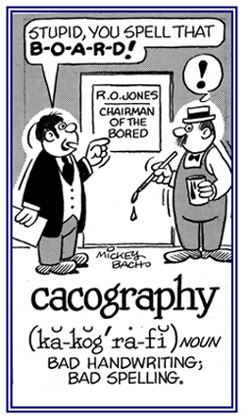caco-, cac-, kako-, kak-
(Greek: bad, harsh, wrong, evil; incorrect; unpleasant; poor; used most of the time as a prefix)
cacogenic (adjective), more cacogenic, most cacogenic
Giving rise to or producing a deteriorated human or their offspring: The medical doctor was researching the factors that caused the cacogenic condition of his patient."
cacogenics (a plural form used as a singular) (noun)
The study of racial degeneration: Cacogenics, also known as dysgenics, is the study of elements that result in the perpetuation of defective genes and characteristics of the offspring of a particular population of people or a species of animals.
An unpleasant or bad taste in the mouth which is a frequent complaint with idiopathic epilepsy when patients are receiving tranquilizer therapy and resulting in some somatic delusional conditions: Cacogeusia is not caused by food, drugs, or other material; but, it is usually a part of a sensation experienced at the beginning of a seizure or of psychomotor epilepsy.
Someone who has poor penmanship, incompetent grammatical usage, and inadequate spelling skills: The college professor arranged for three cacographers in his class to go to a special handwriting tutor to teach them calligraphy because they were writing so poorly that no one could read what they scribbled on their quizzes and tests.
cacographic (adjective), more cacographic, most cacographic
A reference to a bad speller or a bad writer; that is, grammatically and stylistically poor penmanship: Thomas overcame his more cacographic habits by working with a tutor and practicing his handwriting skills every day.
1. Bad writing or bad handwriting; opposed to calligraphy: Olive has always been told that her cacography was astonishing and that she was the only one could read it.
2. Incorrect spelling; a bad system of spelling; such as, that of current English; an antonym of orthography: Carol noticed a lot of cacography in the newspaper and so she wrote a letter to the editor suggesting that he should hire a proofreader.

© ALL rights are reserved.
Go to this Word A Day Revisited Index
2. Incorrect spelling; a bad system of spelling; such as, that of current English; an antonym of orthography: Carol noticed a lot of cacography in the newspaper and so she wrote a letter to the editor suggesting that he should hire a proofreader.

Go to this Word A Day Revisited Index
so you can see more of Mickey Bach's cartoons.
1. A dread of consuming bad water or of being contaminated or infected in some way by it: Because of her cacohydrophobia, Evelyn always carried a bottle of juice with her in order to avoid drinking the impure liquid from a public fountain.
2. An abnormal fear of being exposed to water from the cloaca or waste pipes: Even though she enjoyed the walking tours of the large and ancient city, Lois would not go on the historical sewer walk because of her cacohydrophobia of the polluted liquid that was still there.
2. An abnormal fear of being exposed to water from the cloaca or waste pipes: Even though she enjoyed the walking tours of the large and ancient city, Lois would not go on the historical sewer walk because of her cacohydrophobia of the polluted liquid that was still there.
The involuntary use of vulgar or obscene words, as seen in some schizophrenics: During the students' tour of the medical ward, the doctor pointed out a patient that suffered with cacolalia and who was sitting quietly while muttering indecent and offensive words, apparently not realizing what he was saying.
Bad speaking or pronunciation; socially unacceptable diction: Hester worked with a speech pathologist for many years to overcome her cacology so she could feel more comfortable when speaking in public.
Although Edgar's speech and language were acceptable in the isolated hill community where he grew up, his cacology caused him a lot of embarrassment when he went away to college.
Congenital deformity of one or more arms or legs: Dr. Jonas, the orthopedic surgeon, reassured Janice that the cacomelia of her legs could be corrected by surgery and physiotherapy.
A bad form or shape: Due to a poor diet, Ted's son developed a cacomorphosis of his legs making them appear to be bowed and not straight; as, they usually are with normal physical development.
1. An example of bad nomenclature or terminology; especially, in biology and botany: When the editor had the new botany text proofread, she discovered many examples of caconyms which had to be corrected before publication.
2. A name, especially a taxonomic name, that is considered linguistically undesirable or bad: When correcting Tomas' essay on biological terms, the instructor was amused by some of the caconyms which he used and which needed to be corrected because they were not relevant to the context of the subject.
2. A name, especially a taxonomic name, that is considered linguistically undesirable or bad: When correcting Tomas' essay on biological terms, the instructor was amused by some of the caconyms which he used and which needed to be corrected because they were not relevant to the context of the subject.
A Hippocratic designation for a severe mental disorder: The ancient medical teacher, Hippocrates, often described mysterious maladies as a cacopathia; especially, when the patient seemed to be mentally disoriented.
The substitution of an offensive term for one considered to be acceptable: When he was being particularly obnoxious, the stand up comic used frequent cacophemisms in his routine, insulting many who were in the audience.
An unpleasant combination of loud, often jarring, and discordant sounds: Brenda was from the city and thought that the farm animals with their loud vocal sounds made the most repulsive cacophonia that she had ever heard.


